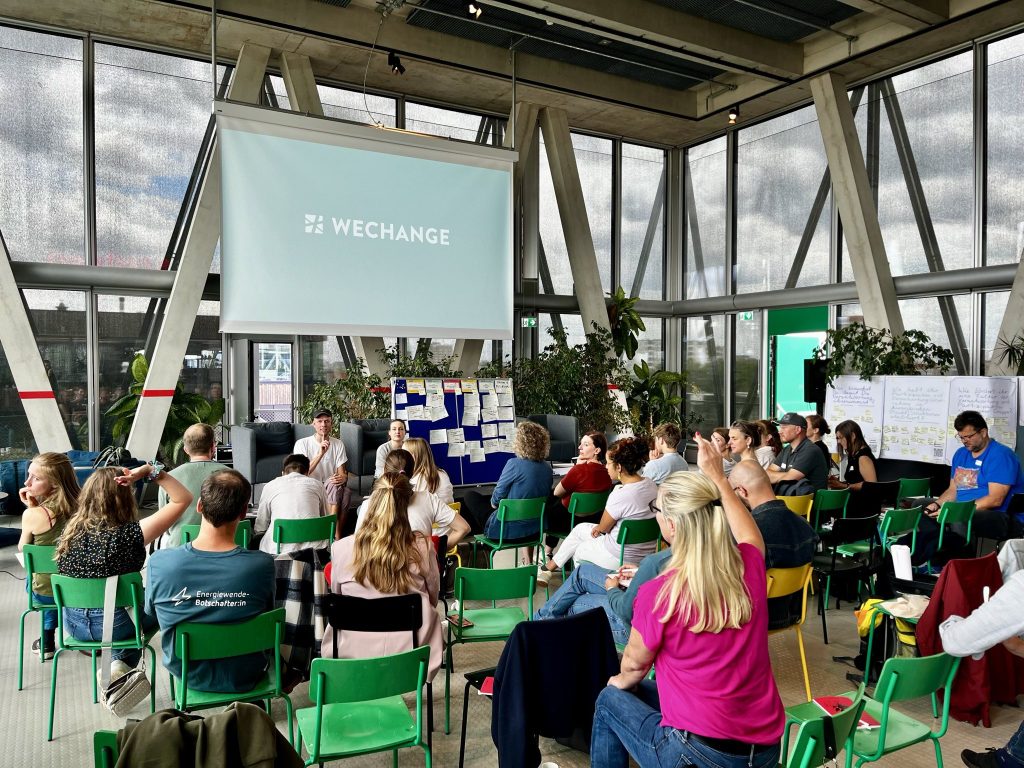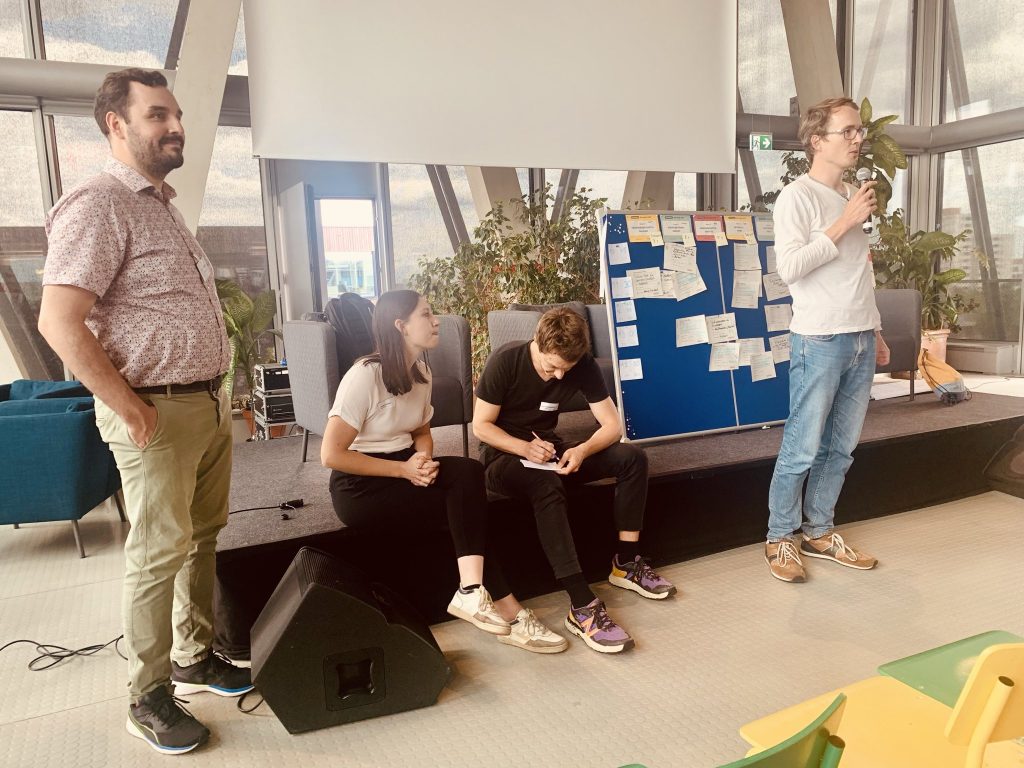GenoDigital is a breath of fresh air in the German co-operative landscape. Founded in 2020 by a group of people in their twenties, the initiative has been a vehicle to demand modernisation of co-operative regulation – in particular, options for virtual general meetings during the pandemic –and a crystallisation point for co-operative startups in new sectors.
While Covid-19 lockdown policies were in place, GenoDigital hosted regular community calls online and has now built a network in the co-operative community that is more boundary-spanning than other longstanding co-operative support organisations.
German co-operative regulation requires that co-ops are members of sector-specific co-operative trade associations that oversee and advise co-operatives. According to Fabian Gebert of GenoDigital, this structure can prove somewhat limiting when it comes to co-operative cross-sector community building and political action. As a result, GenoDigital’s community calls and regional meetups have been popular with people who seek to learn from their peers and bring a co-operative agenda forward.
Gathering
On 5 July, GenoDigital hosted its first larger gathering for co-op minded people in the format of a “barcamp” – an open conference where participants propose session topics at the event, which sets the agenda for the day. Thus, the format provides a bit of a pointer for what is on the minds of people in their respective fields. The event was hosted in a friendly principle 6 manner (co-operation among co-operatives) by the established co-operative daily newspaper “taz” in its new editorial office building in Berlin Mitte. Sparda co-operative bank provided catering for the gathering.

Barcamp delegates (image: GenoDigital)
More than 70 participants showed up from all over Germany to discuss co-operative topics and generally enjoy “an atmosphere of possibility and hope when it comes to building a collaborative economy”, says Gebert.
By far the most prominent topic suggested was all things communication and participation. Wera Stein, of communication agency co-op Wigwam eG, hosted a session on feminist leadership, while Maria Wichmann and colleagues from the inno4ufo research project on SME succession and co-op conversion facilitated a session on pathways to responsibility and participation in newly co-operative organisations.
Related: Platform co-op looks to show a better way forward on AI
Several sessions also revolved around community management and communication for co-ops. The German energy co-op sector’s secondary co-op Bürgerwerke, for example, has launched a platform for member engagement and hosted a session together with activism platform WeChange. Zooming in to IT for co-operative platforms, there were sessions on Open Source development and service software.
And Platform Cooperatives Germany’s Ela Kagel sought to answer the question “How do we create more platform co-ops?” with a group of participants from various co-op sectors.
“I definitely learned something new in the session,” said Kagel, “what with some participants being very critical of replicating platform corporations in a co-operative model.”
Lessons
Co-ops such as FairBnB show that small and local can work for platform organisations, Kagel claims. The question of whether it was even possible to organise a co-operatively run platform organisation that can challenge corporate incumbents – given the massive upfront investments needed to launch services based on the so-called “network effect” – may not have been answered in the session, but the idea of involving local stakeholders such as municipalities, neighbourhood initiatives, or gastronomy more was discussed for so-called last-mile delivery services.

Two sessions were concerned with questions of scaling and governance: Raik Meinshausen, business coach, invited participants to brainstorm how to win more investing, non-voting members for co-ops. An interesting takeaway from the discussion was that the people in the room with major projects had not looked for or been able to get funding from within the co-operative field, but tended to look to crowdfunding types of fundraising to acquire additional capital needed for larger projects, such as real estate purchases.
Lawyer Noah Neitzel and session participants analysed the new model of purpose companies and foundations and compared it to co-operatives. For example, both types of organisations define a clear purpose for their existence by way of by-laws, but unlike co-operatives, purpose organisations are not required to implement democratic governance.
Legal changes
Lastly, Mathias Fiedler of the German trade association of consumer co-operatives (ZdK) presented the new draft law to regulate the legal form of co-operatives, which incorporates many of the changes sought by the GenoDigital initiative, such as the option to hold founding and annual general meetings virtually. Some changes, if ratified, could be far-reaching, such as the change of language on the purpose of a co-operative, which in Germany has hitherto been narrowly understood as “benefiting members” directly and could now be changed to benefiting members indirectly as well – which makes larger-scale or supra-regional co-operations more feasible, for example the generation of electricity for generalised others by energy co-ops that are mandated to feed into networks.
The draft maintains the prohibition of so-called dividend co-operatives that do not pursue substantial operational goals, but would essentially be investment funds. The other potentially meaningful change is the new possibility of creating an additional governing body that is elected by the general membership and has powers to give directives to the managing board. Implementing such a body would require a definition of its functioning in the by-laws, such that it is not an ad-hoc vehicle. However, this provision is seen by some participants as a new scope of possibility with regard to direct democracy in co-operatives.
Ela Kagel of Platform Co-ops Germany left the barcamp event feeling like she had just attended a reunion of sorts. “This was a rare opportunity to meet a diverse group of people,” she said, “and hear what everyone’s working on. The barcamp format really worked for this crowd.”
Kagel finds GenoDigital’s work important and hopes that they will be able to support the development of the co-operative field with their communication skills and creativity.
Given the success of GenoDigital’s community-building approach, the initiative is looking to find a way to sustain its activities with the help of the co-operative community. So far, the co-operative IT provider Datev’s foundation has financed much of GenoDigital’s work. In their closing statement, GenoDigital co-founders Johanna Kuehner and Matti Pannenbaecker reflected that the next step would be to get a sense of in what way the co-operative community would economically support GenoDigital’s ecosystems work – a question for the next community call or barcamp.
- Carla Young is a researcher at the Institute for Ecological Economy Research (IÖW) in Berlin. She engages with organisation theory, economic sociology, and STS to study how people create organisations and technologies that facilitate more equitable and sustainable social and economic relations. Her dissertation Playing the Game or Changing the Game investigated the emergence of a meta-organisation in the field of food co-operatives in the US.

